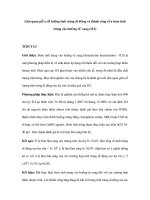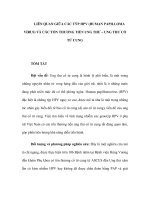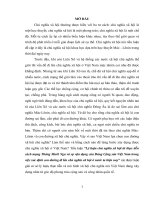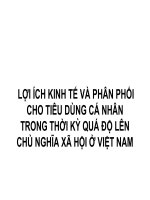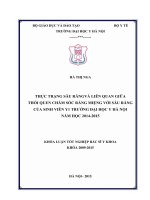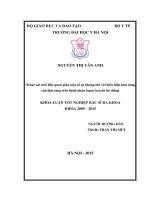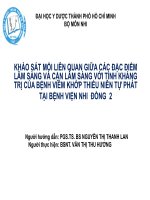giới từ và liên từ các sử dụng trong tiếng anh
Bạn đang xem bản rút gọn của tài liệu. Xem và tải ngay bản đầy đủ của tài liệu tại đây (115.29 KB, 10 trang )
GIỚI TỪ
1. Định nghĩa:
Giới từ là từ loại chỉ sự liên quan giữa các từ loại trong cụm từ, trong câu. Những từ thường đi sau giới từ
là tân ngữ(Object), Verb + ing, Cụm danh từ
Ví dụ:
a. I went into the room.
b. I was sitting in the room at that time.
Ta thấy rõ, ở ví dụ a., "the room" là tân ngữ của giới từ "into". Ở ví dụ b., "the room" là tân ngữ của
giới từ "in".
Chú ý: Các bạn phải luôn phân biệt trạng từ và giới từ, vì thường khi một từ có hai chức năng đó (vừa
là trạng từvà giới từ). Điều khác nhau cơ bản là Trạng từ thì không có tân ngữ theo sau. Hãy xét các câu sau
đây:
Ví dụ:
1. Please, come in. It's raining. (Trạng từ)
We are in the small room. (Giới từ); vì tân ngữ của "In" là "The room"
2. He ran down quickly. (Trạng từ) - vì "quickly" không phải là tân ngữ của "down"; nó
chỉ làtrạng từ chỉ cách thức mà thôi.
3. My dictionary is on the desk. (Giới từ) - vì nó liên kết với tân ngữ: (the desk).
2. Cách sử dụng giới từ trong tiếng Anh:
Có thể nói việc dùng các giới từ không phải dễ, vì mỗi nước có cách dùng giới từ đặc biệt; vậy ta phải
rất chú ý đến nó ngay từ lúc mới học môn ngoại ngữ đó nói chung và tiếng Anh nói riêng.
Trong tiếng Anh, người ta không thể đặt ra các quy luật về các phép dùng giới từ mang tính cố
định cho mỗi giới từ đó - cùng một giới từ, khi đi với từ loại khác nhau thì tạo ra nghĩa khác nhau. Vậy
chúng ta nên học thuộc mỗi khi gặp phải và học ngay từ lúc ban đầu.
Ví dụ:
depend on
independent of
look after
look for
look up to
wait for
think of
make up
look up
live on
3. Các loại giới từ trong tiếng Anh.
Các giới từ trong tiếng Anh có thể được phân thành mấy loại sau:
3.1. Giới từ chỉ Thời gian.
afteratbeforebehindby duringforfrominon sincethroughoutforewarduntilwithin
3.2. Giới từ chỉ Địa điểm/Nơi chốn.
aboutaboveacrossatbeforebehindbel
ow
beneathbesidebeyondbyinoffo
n
overthroughtotowardunderwithinwitho
ut
3.3. Giới từ chỉ Lý do, nguyên nhân.
atforfromof onoverthroughwith
3.4. Giới từ chỉ Mục đích.
afteratfor onto
3.5. Giới từ thường:
afteragainstamongbetween byforfromof on to with
4. Vị trí giới từ
Thông thường, giới từ tiếng Anh được đặt như tiếng Việt; tuy nhiên, nó có thể đặt ngay trước Từ nghi
vấn hay Đại từ.
Ví dụ: What is this medal made of?
Of what is this medal made?
hay
The man whom we listened to is our new teacher.
The man to whom we listened is our new teacher.
5. Cách đặt từ ngữ có giới từ: Vị trí của giới từ trong câu có thể làm thay đổi nghĩa của câu đó.
Ví dụ:
1- A letter was read from his friend in the class room.
A letter from his friend was read in the class room.
(Hai câu trên có nghĩa khác nhau bởi vì giới từ "from" có vị trí khác nhau)
2-With his gun towards the forest he started in the morning.
With his gun, he started towards the forest in the morning.
(Hai câu trên có nghĩa khác nhau bởi vì giới từ "from" có vị trí khác nhau)
6. Một giới Gới từ thông thường:
1. AT, IN, ON
1. AT : dùng trước thời gian ngắn: giờ, phút giây
At 10 o'clock; at this moment; at 10 a.m
2. ON : dùng trước thời gian chỉ: ngày, thứ ngày (trong lịch )
On Sunday; on this day
3. IN : dùng trước thời gian dài: tháng, mùa, năm,
In June; in July; in Spring; in 2005
2. IN, INTO, OUT OF
1. IN: dùng chỉ vị trí (địa điểm - không chuyển hướng)
In the classroom; in the concert hal; in the box
2. INTO: dùng chỉ sự chuyển động từ ngoài vào trong.
I go into the classroom.
3. OUT OF: dùng chỉ sự chuyển động từ trong ra ngoài.
I go out of the classroom.
3. FOR, DURING, SINCE:
1. FOR : dùng để đo khoảng thời gian
For two months
For four weeks
For the last few years
2. DURING : dùng để chỉ hành động xảy ra trong suốt thời gian của sự vật, sự kiện:
During christman time; During the film; During the play
3. SINCE : dùng để đánh dấu thời gian
Since last Saturday, since Yesterday.
4. AT, TO
1. AT: dùng chỉ sự cố định ở một vị trí nào đó tương đối nhỏ, vì nếu diện tích nơi đó lớn hơn ta
dùng "in".
At the door; At home; At school
In Ha Noi; In the world
2. TO: dùng chỉ sự chuyển động tới một nơi nào đó.
Go to the window; Go to the market
5. ON, OVER, ABOVE. (ở trên)
1. ON: dùng chỉ vị trí đứng liền ngay ở trên
On the table; on the desk
2. OVER: dùng chỉ các lớp/thứ tự ở lần trên (áo, quần)
I usually wear a shirt over my singlet.
3. ABOVE: Với nghĩa là trên nhưng chỉ sự cao hơn so với vật khác thấp hơn.
The ceiling fans are above the pupils.
The planes fly above our heads.
6. TILL, UNTIL (tới, cho tới khi)
1. TILL: dùng cho thời gian và không gian.
Wait for me till next Friday (thời gian)
They walked till the end of the road. (không gian)
2. UNTIL: dùng với thời gian.
He did not come back until 11.pm yesterday. (thời gian).
LIÊN TỪ
1. Định nghĩa:
Liên từ là từ dùng để nối các từ loại, cụm từ hay mệnh đề.
2. Phân loại:
Liên từ được chia làm hai loại chính:
a. Đẳng lập (song song):
Dùng loại liên từ này để nối những các từ loại hoặc cụm từ/ nhóm từ cùng một loại, hoặc những mệnh
đề ngang hàng nhau (tính từ với tính từ, danh từ với danh từ ):
Ví dụ:
He and I are students.
She is beautiful and kind.
They are learning to read and write.
b. Liên từ phụ thuộc:
Loại liên từ phụ thuộc nối kết các nhóm từ, cụm từ hoặc mệnh đề có chức năng khác nhau - mệnh đề
phụ với mệnh đề chính trong câu.
3. Những liên từ Đẳng lập (song song):
Những liên từ Đẳng lập gồm:
AND
Ví dụ: She is a good and loyal wife.
I have many books and notebooks.
BOTH AND
Ví dụ: She is both good and loyal.
They learn both English and French.
AS WELL AS
Ví dụ: He has experience as well as knownledge.
NO LESS THAN
Ví dụ: You no less than he are very rich.
NOT ONLY BUT (ALSO)
Ví dụ: He learns not only English but but (also) Chinese.
I like playing not only tennis but (also) football.
OR
Ví dụ: Hurry up, or you will be late.
EITHER OR
Ví dụ: He isn't either good or kind.
I don't have either books or notebooks.
NEITHER NOR
Ví dụ: He drinks neither wine nor beer.
She has neither husband nor children.
BUT
Ví dụ: He is intelligent but very lazy.
She is ugly but hard-working.
THEN
Ví dụ: You have eaten nothing; then you must be very hungry.
The plant looks very faded; then it hasn't been watered for long.
CONSEQUENTLY
Ví dụ: You didn't work hard for this term; consequently, he failed the exam.
HOWEVER
Ví dụ: He is a very lazy student; however, he can pass all the exams easily.
It was raining very hard; however, we went out without umbrellar.
NEVERTHELESS
Ví dụ: She studies very hard; nevertheless, she always gets bad marks.
STILL, YET
Ví dụ: I speak to you peaceably; still/yet you will not listen.
She says she does not love me, yet, I still love her.
OR, ELSE, OTHERWISE
Ví dụ: We have to work hard, or/else/otherwise we will fail the exam.
ONLY
Ví dụ: Go where you like; only do not stay here.
THEREFORE
Ví dụ: He violated the traffic signs, therefore he was punished.
4. Những liên từ phụ thuộc (chính phụ):
Những liên từ phụ thuộc:
FOR
Ví dụ: He will surely succeed, for (because) he works hard.
WHEREAS
Ví dụ: He learns hard whereas his friends don't.
Wise men love truth whereas fools avoid it.
WHILE
Ví dụ: Don't sing while you work.
Don't talk while you eat.
BESIDES, MOREOVER
Ví dụ: We have to study hard at school; besides, we must pay attention
to physical exercise.
He stole two watches; moreover, he broke the window.
SO
Ví dụ: He is a good teacher; so, he is very popular with students.
It rained very hard; so, we didn't go out that night.
HENCE
Ví dụ: I had not money about me; hence I did not buy the book.
He came late; hence, he missed the first part of the lesson.
- Liên từ nối mệnh đề (như trạng ngữ):
a. Thời gian (Time):
AFTER
Ví dụ: A man shoud take a little rest, after he has worked hard.
The ship was checked carefully after she had been built.
AS
Ví dụ: He came her, as the clock struck six.
They left as the bell rang
AS SOON AS
Ví dụ: I will phone you as soon as I come home.
They will get married as soon as they finish university.
BEFORE
Ví dụ: Don't count your chickens before they are hatchd.
He talks as if he were very wise.
. Ví dụ: He has been very weak, since he was taken sick.
AS LONG AS
Ví dụ: No one can harm us, as long as we remain friends.
I will lend you some money as long as you promise to pay me back.
UNTIL
Ví dụ: People do not know the value of health until they lose it.
WHEN
Ví dụ: When you visit this country, you should bring thick winter clothes.
WHILE
Ví dụ: Make hay while the sun shines.
Step while you dance.
b. Nơi chốn (Places):
WHERE
Ví dụ: The bed room is the best place where I do my homework.
WHEREVER
Ví dụ: His mother follows him wherever he goes.
I will go wherever to find a suitable job for me.
c. Thể cách (Manner):
AS
Ví dụ: Do as I told you to do.
AS IF
Ví dụ: He talks as if he knew everything about her.
He dances as if he were a professional dancer.
d. So sánh (Comparisons):
AS
Ví dụ: He is as tall as his brither.
This bag is as expensive as that one.
THAN
Ví dụ: She is more beautiful than her sister.
She looks fatter than his friend.
e. Lí do (Reasons):
AS
Ví dụ: As it rained very hard, we stopped they games.
BECAUSE
Ví dụ: We could not pass the test because we didn't learn hard.
I didn't meet her because she had left earlier.
SINCE
Ví dụ: I must go since she has telephoned three times.
f. Mục đích (Purposes):
THAT
Ví dụ: I work hard that I may succeed in life.
SO THAT
Ví dụ: We went very early so that we could catch the last bus.
IN ORDER THAT
Ví dụ: We learn French in order to study in France.
g. Điều kiện (Conditions) :
IF
Ví dụ: I will phone him if I have his phone number.
UNLESS (IF NOT)
Ví dụ: You will be late unless you set off now.
Unless you work hard, you will not pass the eams.
PROVIDED THAT
Ví dụ: I will pardon him provided that he acknowledge his fault.
You can enter the room provided that you have the ticket
IN CASE
Ví dụ: You should take an umbrella in case it rains.
Please take a map with you in case (that) you may get lost.
h. Sự tương phản, trái ngược:
ALTHOUGH, THOUGH, EVEN THOUGH
Ví dụ: Though/even though /although it rained hard, I went out with her.
AS
Ví dụ: Rich as he is, his isn't ever happy.
EVEN IF
Ví dụ: Even if my watch is right, we will be too late.
NOT WITH STANDING THAT
Ví dụ: He is poor not with standing that he works very hard.
